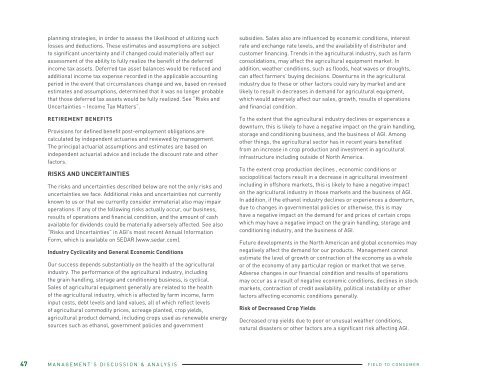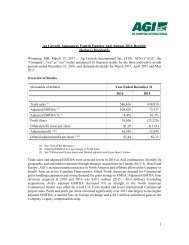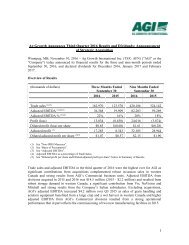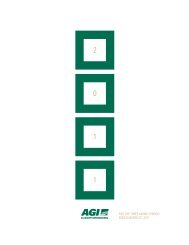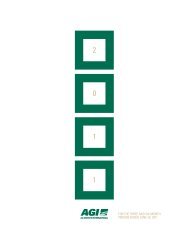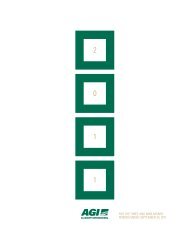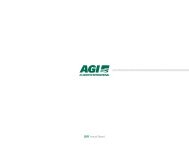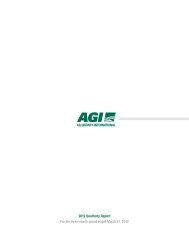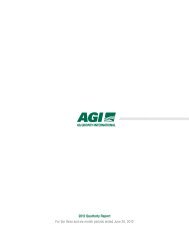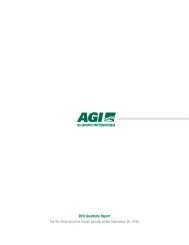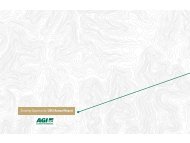2016 Annual Report For Web 7.3MB
You also want an ePaper? Increase the reach of your titles
YUMPU automatically turns print PDFs into web optimized ePapers that Google loves.
planning strategies, in order to assess the likelihood of utilizing such<br />
losses and deductions. These estimates and assumptions are subject<br />
to significant uncertainty and if changed could materially affect our<br />
assessment of the ability to fully realize the benefit of the deferred<br />
income tax assets. Deferred tax asset balances would be reduced and<br />
additional income tax expense recorded in the applicable accounting<br />
period in the event that circumstances change and we, based on revised<br />
estimates and assumptions, determined that it was no longer probable<br />
that those deferred tax assets would be fully realized. See “Risks and<br />
Uncertainties – Income Tax Matters”.<br />
RETIREMENT BENEFITS<br />
Provisions for defined benefit post-employment obligations are<br />
calculated by independent actuaries and reviewed by management.<br />
The principal actuarial assumptions and estimates are based on<br />
independent actuarial advice and include the discount rate and other<br />
factors.<br />
RISKS AND UNCERTAINTIES<br />
The risks and uncertainties described below are not the only risks and<br />
uncertainties we face. Additional risks and uncertainties not currently<br />
known to us or that we currently consider immaterial also may impair<br />
operations. If any of the following risks actually occur, our business,<br />
results of operations and financial condition, and the amount of cash<br />
available for dividends could be materially adversely affected. See also<br />
“Risks and Uncertainties” in AGI’s most recent <strong>Annual</strong> Information<br />
<strong>For</strong>m, which is available on SEDAR (www.sedar.com).<br />
Industry Cyclicality and General Economic Conditions<br />
Our success depends substantially on the health of the agricultural<br />
industry. The performance of the agricultural industry, including<br />
the grain handling, storage and conditioning business, is cyclical.<br />
Sales of agricultural equipment generally are related to the health<br />
of the agricultural industry, which is affected by farm income, farm<br />
input costs, debt levels and land values, all of which reflect levels<br />
of agricultural commodity prices, acreage planted, crop yields,<br />
agricultural product demand, including crops used as renewable energy<br />
sources such as ethanol, government policies and government<br />
subsidies. Sales also are influenced by economic conditions, interest<br />
rate and exchange rate levels, and the availability of distributor and<br />
customer financing. Trends in the agricultural industry, such as farm<br />
consolidations, may affect the agricultural equipment market. In<br />
addition, weather conditions, such as floods, heat waves or droughts,<br />
can affect farmers’ buying decisions. Downturns in the agricultural<br />
industry due to these or other factors could vary by market and are<br />
likely to result in decreases in demand for agricultural equipment,<br />
which would adversely affect our sales, growth, results of operations<br />
and financial condition.<br />
To the extent that the agricultural industry declines or experiences a<br />
downturn, this is likely to have a negative impact on the grain handling,<br />
storage and conditioning business, and the business of AGI. Among<br />
other things, the agricultural sector has in recent years benefited<br />
from an increase in crop production and investment in agricultural<br />
infrastructure including outside of North America.<br />
To the extent crop production declines , economic conditions or<br />
sociopolitical factors result in a decrease in agricultural investment<br />
including in offshore markets, this is likely to have a negative impact<br />
on the agricultural industry in those markets and the business of AGI.<br />
In addition, if the ethanol industry declines or experiences a downturn,<br />
due to changes in governmental policies or otherwise, this is may<br />
have a negative impact on the demand for and prices of certain crops<br />
which may have a negative impact on the grain handling, storage and<br />
conditioning industry, and the business of AGI.<br />
Future developments in the North American and global economies may<br />
negatively affect the demand for our products. Management cannot<br />
estimate the level of growth or contraction of the economy as a whole<br />
or of the economy of any particular region or market that we serve.<br />
Adverse changes in our financial condition and results of operations<br />
may occur as a result of negative economic conditions, declines in stock<br />
markets, contraction of credit availability, political instability or other<br />
factors affecting economic conditions generally.<br />
Risk of Decreased Crop Yields<br />
Decreased crop yields due to poor or unusual weather conditions,<br />
natural disasters or other factors are a significant risk affecting AGI.<br />
Both reduced crop volumes and the accompanying decline in farm<br />
incomes can negatively affect demand for grain handling, storage<br />
and conditioning equipment. Poor or unusual weather conditions and<br />
natural disasters may be exacerbated by the effects of climate change.<br />
Potential Volatility of Production Costs<br />
Our products include various materials and components purchased<br />
from others, some or all of which may be subject to wide price variation.<br />
Consistent with industry practice, AGI seeks to manage its exposure<br />
to material and component price volatility by planning and negotiating<br />
significant purchases on an annual basis, and through the alignment of<br />
material input pricing with the terms of contractual sales commitments.<br />
AGI endeavours to pass through to customers, most, if not all, material<br />
and component price volatility. There can be no assurance, however,<br />
that industry conditions will allow AGI to continue to reduce its exposure<br />
to volatility of production costs by passing through price increases to<br />
its customers. A significant increase in the price of any component or<br />
material, such as steel, could adversely affect our profitability.<br />
<strong>For</strong>eign Exchange Risk<br />
AGI’s consolidated financial statements are presented in Canadian<br />
dollars. AGI generates the majority of its sales in U.S. dollars and the<br />
remainder in Canadian dollars and other currencies including Euros,<br />
but a materially smaller proportion of its expenses are denominated in<br />
U.S. dollars and currencies other than the Canadian dollar. In addition,<br />
AGI denominates a portion of its long term borrowings in U.S. dollars as<br />
part of its foreign currency hedging strategy. Accordingly, fluctuations<br />
in the rate of exchange between the Canadian dollar and principally the<br />
U.S. dollar may significantly affect the Company’s financial results. If<br />
the Canadian dollar strengthens relative to the U.S. dollar, profit and<br />
adjusted EBITDA would decline whereas a weakening of the Canadian<br />
dollar relative to the U.S. dollar would increase profit and adjusted<br />
EBITDA. The Company regularly enters hedging arrangements as<br />
part of its foreign currency hedging strategy to partially mitigate the<br />
potential effect of fluctuating exchange rates. To the extent AGI enters<br />
into such hedging arrangements, it potentially foregoes the benefits<br />
that might result from a weakening of the Canadian dollar relative to<br />
the U.S. dollar or other currencies in which it generate sales and in<br />
47 MANAGEMENT’S DISCUSSION & ANALYSIS<br />
FIELD TO CONSUMER<br />
<strong>2016</strong> ANNUAL REPORT<br />
MANAGEMENT’S DISCUSSION & ANALYSIS 48


